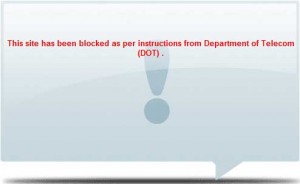India has asked internet service providers to block certain websites and restricted users from sending bulk SMSes for two weeks following threatening content which caused panic across the country, official sources said.
Around 156 websites were blocked by internet service providers (ISPs) at the instructions of the government over the weekend, in line with their license rules, said Rajesh Chharia, president of Internet Service Providers Association of India.
A large number of people from India’s northeast, working in Bangalore and other cities, fled back to their homes after receiving SMSes (short message service) and online threats of alleged Muslim retaliation for recent violence between Muslims and indigenous communities in the state of Assam.
Northeastern migrants usually work at lower-paid jobs such as servants, waiters and assistants at stores and hair-dressing salons. As the cost of mobile phones and services has fallen, they have signed up to stay in touch with their families back home.
Some people were also charged by the police for allegedly using SMS messages and online content using morphed images to incite Muslims.
Police in Bangalore arrested a person running a store where consumers can buy pre-paid mobile credit. He had allegedly obtained the mobile numbers of people who had come to his store to purchase additional mobile talk-time and sent out SMSes to these numbers, according to a report.
India’s Ministry of IT and Communications has notified all “intermediaries,” which would include social networking and video-sharing sites such as YouTube and Facebook, to take the necessary action to disable any “inflammatory and hateful content” hosted on their websites.
The ministry said that a lot of such content targeted the North-Eastern people. Publishing and hosting of such content is an offense, it added.
Content intended to incite violence is prohibited on YouTube, and Google acts quickly to remove such material flagged by our users, the company said in a statement. “We comply with valid legal requests from authorities wherever possible, consistent with our longstanding policy,” it added.
YouTube’s Community Guidelines also prohibit things like hate speech, shocking or disturbing content, illegal acts, and graphic violence. It gives users tools to flag content so that it can review and remove anything that violates its policies, Google added.
The country’s home minister Sushil Kumar Shinde said in a statement that social media-networking sites are being misused by “elements based in Pakistan” to circulate false pictures and stories that aim to rouse communal sentiments in India, according to India’s Press Information Bureau. He sought Pakistan’s cooperation in checking and neutralising such elements. India and Pakistan have a long-standing dispute over Kashmir.
This has the scale of a cyberwar, as content resurfaces quickly in new locations each time the ISP tries to block, said an ISP on condition of anonymity. He would not comment whether the activity could be traced to Pakistan.






